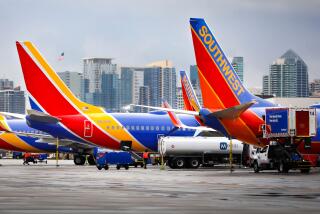Wasteful Airline Bailouts
- Share via
After the Sept. 11 terrorist attacks, it took only a few days for Congress and the Bush administration to whip out the federal checkbook with a $15-billion bailout for U.S. air carriers. Earlier this week, taxpayers got a good idea of what kind of return they could expect from that investment.
With its second bankruptcy filing in two years, US Airways is like a drowning swimmer who keeps bobbing back to the surface. The struggling carrier got a nice chunk of that federal bailout money after emerging from Chapter 11 the first time around, winning a $900-million loan guarantee. It’s possible that this time the airline will be able to keep its head above water, but more likely it’s heading for the bottom and taking loads of public money with it.
U.S. airlines were seriously damaged by 9/11 -- the two-day shutdown of U.S. airspace after the attack cost them hundreds of millions alone -- but that’s not what’s driving US Airways, United Airlines and other high-cost carriers to the brink. They were struggling to compete with lower-cost rivals well before the terrorist attacks led many Americans to put business and personal travel on hold. The Internet gave travelers the ability to find lower fares and friendlier flight schedules. Big airlines and their heavily unionized workforces are working together (with varying degrees of success) to pull themselves out of their deep financial holes, yet the nation’s so-called legacy airlines, carrying higher wages and more-costly benefits, still aren’t financially competitive with Southwest Airlines, JetBlue and other lower-cost companies.
The federal government shouldn’t be shoveling money into failing businesses. It’s a poor use of taxpayer dollars, and it’s unfair to the airlines that aren’t receiving loan guarantees.
Instead, Washington should revisit federal regulations that make it difficult for domestic airlines to merge or create stronger marketing alliances. It’s also time to end restrictions that keep foreign airlines from flying routes between cities in the U.S. -- or even purchasing a domestic carrier. Both of those moves would give passengers more choices.
Congress approved the airline bailout out of fear that big carriers would collapse, disrupting the nation’s air transit system and damaging the economy. Some government assistance may have been needed to compensate for the immediate effects of the terrorist attacks. But the huge bailout that resulted has served mainly to extend the lives of a few dinosaurs that were headed for extinction anyway. Other airlines eventually will find ways to make profitable use of the gates, airlines and employees that a failed airline is forced to abandon.
The federal government should bolster funding for programs that keep airline passengers safe and secure. And then it should get out of the way.
More to Read
Inside the business of entertainment
The Wide Shot brings you news, analysis and insights on everything from streaming wars to production — and what it all means for the future.
You may occasionally receive promotional content from the Los Angeles Times.










